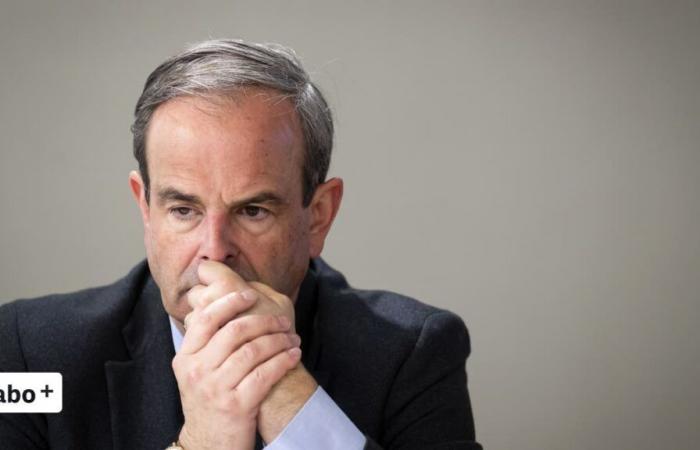Why does Gerhard Pfister give up?
Hardly any other politician displays his claim to power as publicly as the centrist president. Now he doesn’t want to rule. How does that fit together?
Gerhard Pfister announced on Saturday that he would not run for the Federal Council.
Bild: Keystone
Mitte President Gerhard Pfister’s decision not to run for Federal Council surprises many. Hardly any politician has formulated and promoted the claim to power more clearly: Pfister has been working for years to establish the center party as the “third pole” in the party landscape – and to push the FDP to the margins. He also subordinated the political direction of the party to this goal: In terms of content, he always adjusted the course with an eye on increasing the percentage of voters.
And now all the stars finally seem to be aligned, the timing is perfect. He announced his resignation as party president two weeks before Viola Amherd announced his resignation. Given his claim to power, his candidacy would also be a logical career step: the center party grew again for the first time in 2023 – success proves him right.
So why doesn’t Gerhard Pfister want to become a Federal Councilor?
Limited power because of the insurmountable FDP-SVP bloc
Gerhard Pfister doubts that a center Federal Councilor can currently achieve much in the government, as he explains in an interview with the “Tages-Anzeiger”. The Federal Council is “relying too heavily on the power of the four-party block of SVP and FDP”. This is problematic because it neither corresponds to the majority in parliament nor the will of the electorate.
But wouldn’t it be important to stand up to the quartet? To counter them with a politically stable and argumentatively strong voice? As a National Councilor, Pfister claims he could achieve more.
However, he would have to provide this proof first. The claim is unfounded, as is the claim that there is too little discussion in the Federal Council. What is clear, however, is that the center wants to attack the FDP’s second Federal Council seat at the next opportunity. This was confirmed by parliamentary group leader Philipp Bregy to the NZZ am Sonntag.
If the center’s plan works, it will suddenly become the most powerful person in the government: the tipping point between right and left.
Accusations against the Secretary General are flying around his ears
The allegations against General Secretary Gianna Luzio have been fueled anew since December: Since six former employees anonymously criticized her management style in 2023, 45-year-old Luzio has been under increased scrutiny. Individual group members complain that the allegations have not been dealt with sufficiently enough. Center Councilor Andrea Gmür even calls for an external investigation.
-However, the reports from the center party’s external ombudsman show that there are no leadership problems in the general secretariat headed by Luzio. Pfister is therefore convinced that the hostility is actually aimed at him personally. And he says emphatically that the allegations did not influence his decision.
Pfister did the math
Anyone who wants to become a Federal Councilor needs the support of Parliament. The United Federal Assembly is the electoral body of the Swiss government. As a shrewd strategist, Pfister has thought about it; in an interview with the “Tages-Anzeiger” he talks about the importance of the “opportunity factor”. And his is quite small. After Pfister had flirted with the Federal Council office for a long time and was considered the favorite, it is now becoming increasingly clear that his election would be anything but certain.
So he has lost a lot of goodwill among his natural allies: he has been harassing the FDP for years. He doesn’t win any popularity awards from the SVP either. And although he maintains a good relationship with Cédric Wermuth, he is anything but certain about the votes from the left.
Above all, he lacks the success of his own faction. Many members of the Council of States dislike the way he sets the pace and how he increasingly leans to the left politically. Parliamentarians therefore doubt that their own parliamentary group would nominate Gerhard Pfister for the Federal Council ticket.
Pfister himself says he cannot bend over backwards to run for office. Maybe he’s just done the math already.
«Kei Luscht»
He doesn’t have the slightest doubt about his skills, as he tells the “Tages-Anzeiger”. “Of course I asked myself whether I could do it. And with all my modesty: I would be confident in the office.” And many others would too – otherwise the murmurs after his declaration of renunciation wouldn’t be so loud.
But he also asked himself whether the position was a good fit for him. The answer is: no. “Anyone who knows me a little better knows that I wouldn’t be a happy Federal Councilor.”
Pfister is not the first top candidate who does not want to take on the office. Councilor of States Isabelle Chassot already stated that she lacked the desire to run for office. Fellow member of the Council of States Benedikt Würth declares that he will not run for office for personal reasons. And parliamentary group leader Philipp Bregy is also canceling because he would like to continue to spend time with his small children.
And then everything turns out differently
Contrary to all expectations, Pfister is not running. He seems to enjoy this element of surprise. He himself speaks of a “big misunderstanding”. The stereotype is spread in public that he always worked strategically and tactically towards the office. That is not the case.
Anyone who thinks it’s pure coquetry could be mistaken: In any case, he recommends that members of parliament not write Gerhard Pfister’s name on the ballot paper. He would not accept the election.






